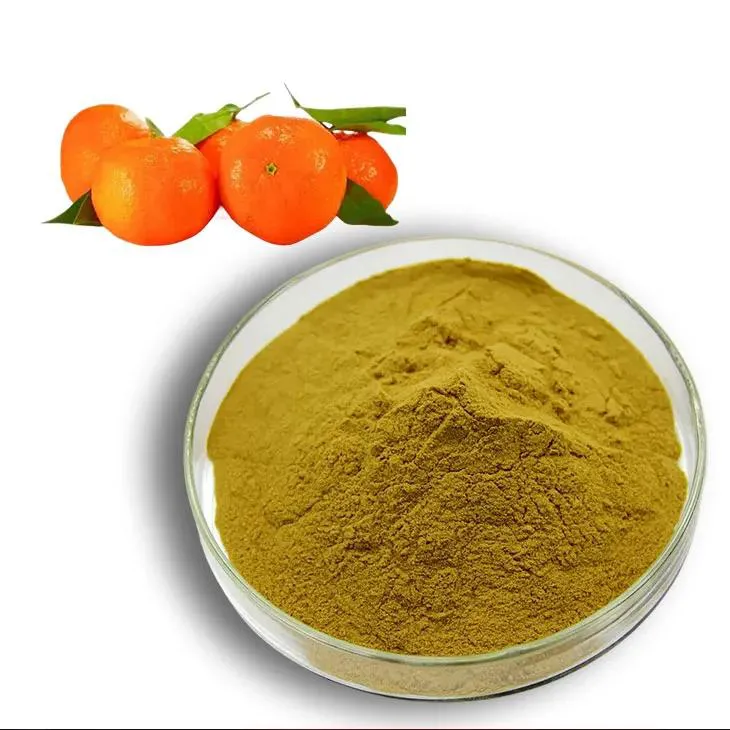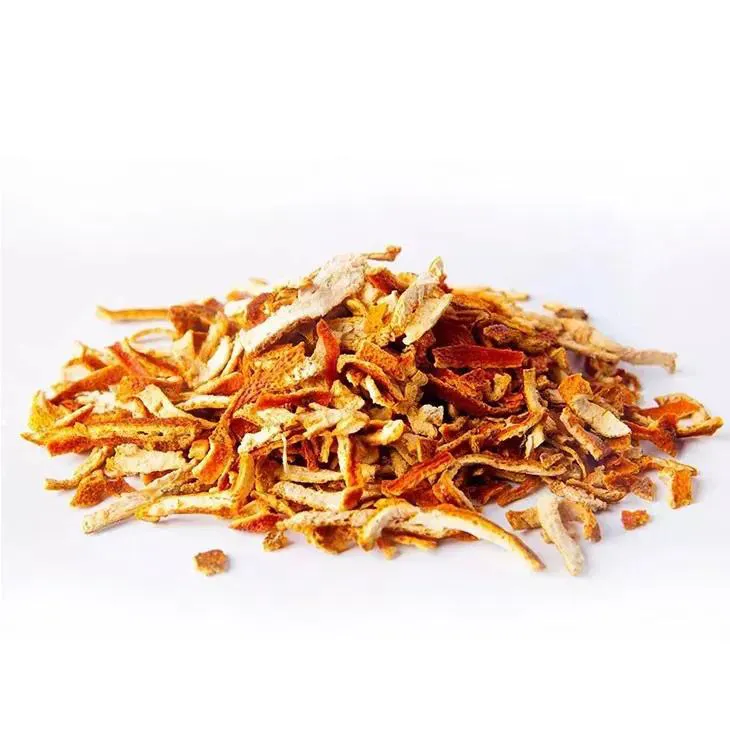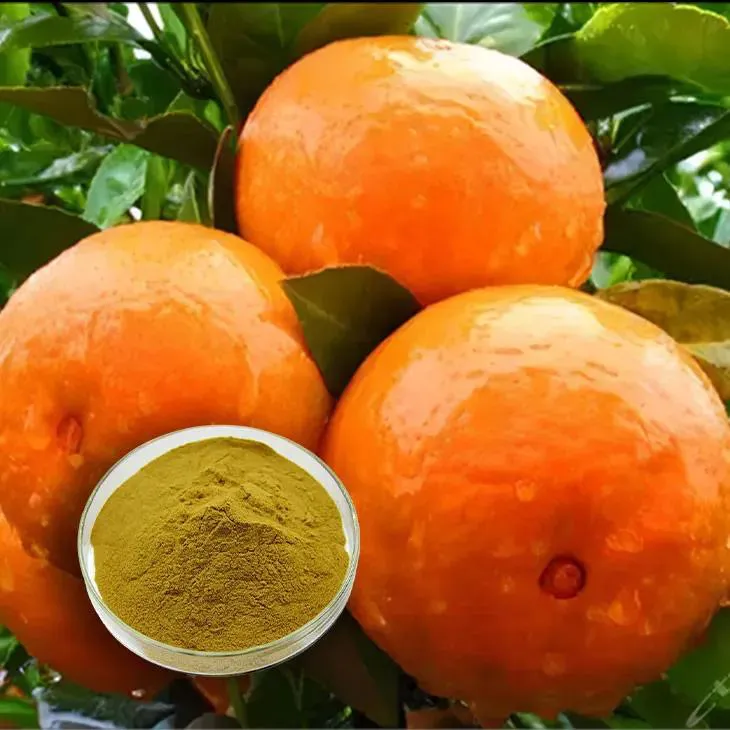- 0086-571-85302990
- sales@greenskybio.com
Pure 85% citrus bioflavonoids.
2024-12-17

Introduction
In the realm of nutrition, pure 85% Citrus bioflavonoids have emerged as a fascinating discovery. These bioflavonoids, sourced from citrus fruits, hold a plethora of benefits for human health. Citrus fruits, such as oranges, lemons, and grapefruits, are well - known for their refreshing taste and high vitamin C content. However, it is the bioflavonoids present in these fruits that are increasingly being recognized for their unique properties.

What are Citrus bioflavonoids?
Chemical Structure
Citrus bioflavonoids are a group of polyphenolic compounds. They have a complex chemical structure that consists of multiple phenolic rings. This structure gives them their characteristic antioxidant properties. For example, flavanones, which are a type of citrus bioflavonoid, have a specific arrangement of hydroxyl groups on their phenolic rings. This arrangement enables them to scavenge free radicals effectively.Occurrence in Citrus Fruits
These bioflavonoids are found in various parts of citrus fruits. In the peel, they are present in relatively high concentrations. The white pith that lies beneath the peel also contains a significant amount of bioflavonoids. Even the pulp of citrus fruits contains these beneficial compounds, although in lower concentrations compared to the peel and pith. For instance, in oranges, Hesperidin, a well - studied citrus bioflavonoid, is abundant in the peel and can be extracted for use in supplements.
Antioxidant Properties
Free Radical Scavenging
One of the most important functions of pure 85% citrus bioflavonoids is their role as antioxidants. Free radicals are highly reactive molecules that can cause damage to cells in the body. They are produced during normal metabolic processes, as well as in response to environmental factors such as pollution and radiation. Citrus bioflavonoids act as free - radical scavengers, neutralizing these harmful molecules. For example, they can donate electrons to free radicals, thereby stabilizing them and preventing them from causing oxidative damage to cellular components such as DNA, proteins, and lipids.Protecting Cells from Oxidative Stress
Oxidative stress occurs when there is an imbalance between the production of free radicals and the body's ability to neutralize them. This can lead to a variety of health problems, including inflammation, aging, and chronic diseases. By scavenging free radicals, citrus bioflavonoids help to protect cells from oxidative stress. They can enhance the activity of the body's own antioxidant defense systems, such as superoxide dismutase and glutathione peroxidase. This combined effect helps to maintain the integrity of cells and tissues, promoting overall health.
Benefits for Cardiovascular Health
Regulating Blood Pressure
Pure 85% citrus bioflavonoids may play a role in regulating blood pressure. High blood pressure is a major risk factor for cardiovascular diseases such as heart attacks and strokes. Some studies suggest that citrus bioflavonoids can relax blood vessels, which in turn helps to lower blood pressure. They may do this by increasing the production of nitric oxide, a molecule that dilates blood vessels. For example, Hesperidin has been shown to have a vasodilatory effect in animal studies, which could potentially translate to blood pressure - lowering effects in humans.Managing Cholesterol Levels
Another aspect of cardiovascular health that citrus bioflavonoids may influence is cholesterol management. They can affect the levels of different types of cholesterol in the body. Some bioflavonoids may help to reduce LDL (low - density lipoprotein) cholesterol, which is often referred to as "bad" cholesterol. At the same time, they may increase HDL (high - density lipoprotein) cholesterol, the "good" cholesterol. This favorable change in the cholesterol profile can reduce the risk of atherosclerosis, a condition in which plaque builds up in the arteries.Contribution to Skin Health
Promoting Collagen Production
Collagen is a key protein in the skin that provides structure and elasticity. As we age, collagen production naturally declines, leading to the appearance of wrinkles and sagging skin. Pure 85% citrus bioflavonoids can stimulate collagen production. They do this by interacting with fibroblasts, the cells responsible for producing collagen in the skin. For example, certain bioflavonoids can activate genes involved in collagen synthesis, resulting in increased production of this important protein. This can help to keep the skin looking youthful and firm.Protecting Against Skin Damage
In addition to promoting collagen production, citrus bioflavonoids can also protect the skin from damage. Their antioxidant properties enable them to neutralize free radicals that are generated in the skin due to exposure to ultraviolet (UV) radiation, pollution, and other environmental factors. By reducing oxidative damage, they can prevent premature aging of the skin, such as the formation of age spots and fine lines. Moreover, they may also have anti - inflammatory properties, which can be beneficial for treating skin conditions such as acne and eczema.Other Potential Health Benefits
Anti - Inflammatory Effects
Chronic inflammation is associated with many diseases, including arthritis, diabetes, and certain cancers. Pure 85% citrus bioflavonoids have shown anti - inflammatory properties in some studies. They can inhibit the production of inflammatory mediators such as cytokines and prostaglandins. This anti - inflammatory action may help to reduce the symptoms of inflammatory diseases and potentially prevent the development of chronic inflammatory conditions.Enhancing Immune Function
The immune system is crucial for protecting the body against infections and diseases. Citrus bioflavonoids may contribute to a stronger immune system. They can stimulate the activity of immune cells such as lymphocytes and macrophages. Additionally, they may enhance the production of antibodies, which are proteins that help the body recognize and neutralize foreign invaders. By supporting immune function, citrus bioflavonoids can help the body to better defend itself against various pathogens.How to Incorporate Citrus Bioflavonoids into Your Diet
Eating Citrus Fruits
The simplest way to obtain citrus bioflavonoids is by consuming citrus fruits. Oranges, lemons, limes, and grapefruits are all excellent sources. You can eat them whole, drink their juices, or use them in cooking and baking. For example, adding slices of lemon to your water or using orange zest in a salad dressing can provide a boost of bioflavonoids.Taking Supplements
If you are unable to consume enough citrus fruits, or if you want a more concentrated dose of bioflavonoids, supplements are available. When choosing a supplement, look for one that contains pure 85% citrus bioflavonoids. It is important to follow the recommended dosage instructions on the supplement label. However, it is always advisable to consult a healthcare provider before starting any new supplement regimen.Conclusion
Pure 85% citrus bioflavonoids are a potent natural resource with a wide range of potential health benefits. Their antioxidant, cardiovascular, skin - health, and other properties make them a valuable addition to a healthy lifestyle. Whether through consuming citrus fruits or taking supplements, incorporating these bioflavonoids into your diet can be a step towards achieving better overall well - being. However, more research is still needed to fully understand all of their mechanisms of action and potential applications.
FAQ:
What are citrus bioflavonoids?
Citrus bioflavonoids are natural compounds found in citrus fruits. They have various beneficial properties for the body, such as antioxidant activity and potential contributions to cardiovascular and skin health, as seen in the case of Pure 85% citrus bioflavonoids.
How do the 85% citrus bioflavonoids act as antioxidants?
As antioxidants, the 85% citrus bioflavonoids can neutralize free radicals in the body. Free radicals are unstable molecules that can cause oxidative damage to cells. By donating electrons to these free radicals, the bioflavonoids prevent them from reacting with and damaging important cellular components like DNA, proteins, and lipids.
Can Pure 85% citrus bioflavonoids really regulate blood pressure?
There is evidence to suggest that citrus bioflavonoids may play a role in regulating blood pressure. They might work through various mechanisms, such as improving endothelial function or influencing the renin - angiotensin - aldosterone system. However, more research is still needed to fully understand the extent of their effect on blood pressure in the context of Pure 85% citrus bioflavonoids.
How do citrus bioflavonoids promote collagen production for skin health?
Citrus bioflavonoids can promote collagen production by interacting with fibroblasts, which are the cells responsible for synthesizing collagen in the skin. They may stimulate the fibroblasts to increase the production of collagen, which helps in maintaining the skin's elasticity, firmness, and overall youthful appearance.
Are there any side effects of taking Pure 85% citrus bioflavonoids?
In general, when taken in appropriate amounts, Pure 85% citrus bioflavonoids are considered safe for most people. However, some individuals may experience mild side effects such as gastrointestinal discomfort. Also, people with certain medical conditions or those taking specific medications should consult a healthcare provider before starting to take citrus bioflavonoids supplements, as there could be potential interactions.
Related literature
- The Role of Citrus Bioflavonoids in Health and Disease"
- "Citrus Bioflavonoids: A Review of Their Antioxidant and Anti - Inflammatory Properties"
- "Bioflavonoids from Citrus Fruits: Potential Benefits for Cardiovascular Health"
- ▶ Hesperidin
- ▶ citrus bioflavonoids
- ▶ plant extract
- ▶ lycopene
- ▶ Diosmin
- ▶ Grape seed extract
- ▶ Sea buckthorn Juice Powder
- ▶ Beetroot powder
- ▶ Hops Extract
- ▶ Artichoke Extract
- ▶ Reishi mushroom extract
- ▶ Astaxanthin
- ▶ Green Tea Extract
- ▶ Curcumin Extract
- ▶ Horse Chestnut Extract
- ▶ Other Problems
- ▶ Boswellia Serrata Extract
- ▶ Resveratrol Extract
- ▶ Marigold Extract
- ▶ Grape Leaf Extract
- ▶ blog3
- ▶ blog4
- ▶ blog5
-
Certified Organic Almond Extract Powder Set.
2024-12-17
-
Soy Extract
2024-12-17
-
Nutmeg Extract
2024-12-17
-
Saffron Extract Powder
2024-12-17
-
Grapefruit Seed Extract Powder
2024-12-17
-
Angelica sinensis extract
2024-12-17
-
Acerola Extract
2024-12-17
-
Curcuma Longa Extract/Turmeric extract
2024-12-17
-
Red Vine Extract
2024-12-17
-
Uridine-5'-monophosphate Disodium salt
2024-12-17
-
Agaricus Blazei Extract
2024-12-17





















